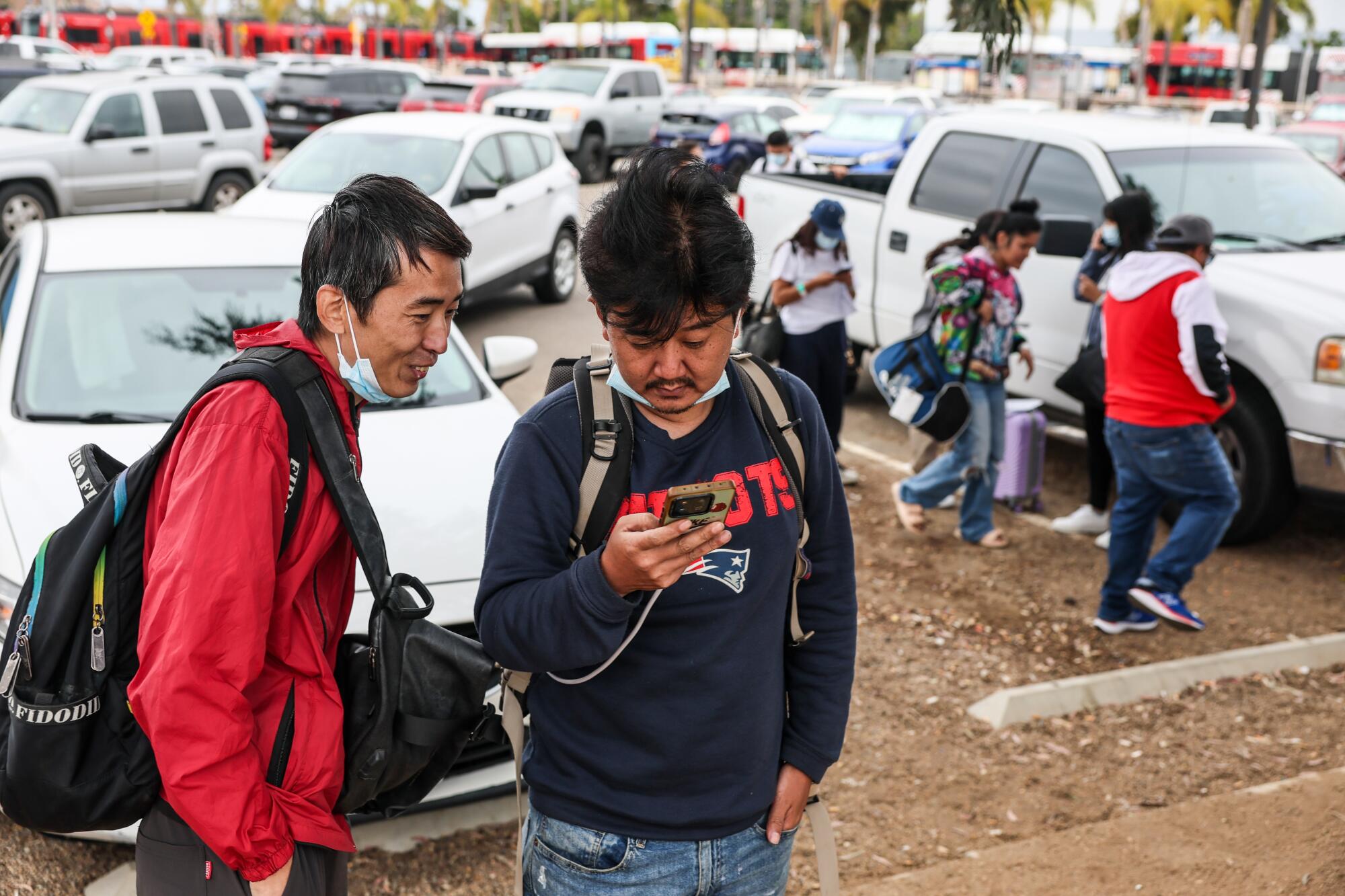The government of Ecuador on Tuesday suspended a policy allowing visa-free entry of Chinese citizens in an apparent move to crack down on asylum seekers who fly into the South American nation en route to the United States.
The rule change comes as U.S. policymakers — alarmed about increasing numbers of asylum seekers from across the globe arriving at the southwestern border — have pushed to shut down illicit migration corridors leading to the United States.
Over the last year, Ecuador has become a key transit point for tens of thousands of Chinese nationals intending to travel onward to the U.S.-Mexico border. Many eventually cross into California.
From Ecuador, many Chinese migrants make their way to Tijuana and other points in the Mexican state of Baja California — an overland trek of more than 3,000 miles, through jungles, deserts and cities — and enter neighboring San Diego County. Most give themselves up to the U.S. Border Patrol, requesting asylum.

Volunteers give migrants food at a makeshift camp near the border wall at Jacumba Hot Springs, Calif.
(Robert Gauthier / Los Angeles Times)
The Ecuadorean Ministry of Foreign Affairs, in a statement posted on X, cited a “worrying increase in migratory flows from China.” Chinese citizens were “using Ecuador as a starting point to reach other destinations in the hemisphere,” it said.
The Biden administration, seeking to counter Republican assertions that the border is out of control, has been pressuring Mexico and other transit nations to crack down on asylum seekers from across the world who have been traveling through South and Central America and Mexico en route to the U.S. border.
It was not clear whether Washington specifically requested that Ecuador tighten its visa policy for Chinese nationals. Messages left with the U.S. Embassy in Quito were not returned.
The numbers of undocumented Chinese nationals entering into San Diego County illegally from Mexico have grown dramatically in recent years, with the area now the main crossing point for nearly all Chinese citizens seeking asylum in the United States, according to U.S. government statistics.

Chinese national Zhang Hao books a taxi outside the Iris Avenue bus station in San Diego, where the U.S. Border Patrol dropped him and dozens of other asylum seekers.
(Robert Gauthier / Los Angeles Times)
From the start of this fiscal year on Oct. 1, 2023, through April, the U.S. Border Patrol in San Diego recorded 27,135 apprehensions of Chinese nationals, more than double the 10,520 detentions in all of the previous fiscal year — and almost 30 times the 947 apprehensions of Chinese migrants in fiscal 2022.
Most Chinese asylum seekers detained at the southwest border are released pending future court dates in U.S. immigration courts, officials say.
Whether Ecuador’s action will help reduce the number of migrants from China remains a question mark. Many say they are fleeing a slumping economy and political repression. And they often are aided by smuggling rings that sometimes charge tens of thousands of dollars to reach the U.S.
“What Ecuador has done might have an impact in the short term, but in the long terms, migrants from China will likely find other options,” said Adriana Jasso, who coordinates the U.S.-Mexico border program for the American Friends Service Committee in San Diego.
“With Chinese nationals, as with nationals from India and other far-away places, there are highly sophisticated networks that help them,” Jasso said. “These networks are are incredibly quick and flexible and can easily find different routes to come to the United States-Mexico border area.”
Gil Guerra, immigration policy analyst with the Niskanen Center, a Washington-based think tank, agreed that Ecuador’s moves will lead migrants to other transit points.
“I do think we’ll see a temporary slowdown, but it will likely result in a redirection of Chinese migration,” Guerra said. “This doesn’t mean the migration stops entirely. Migrants are very resilient.”
Other countries in Latin America and the Caribbean still allow visa-free travel for Chinese visitors, Guerra noted. Many Chinese migrants are professionals and have the money and resources to find alternate routes to the U.S. and engage smugglers to help them, he noted.
“This trend of relatively wealthy people from China fleeing will likely continue, absent a change in the structural issues behind it — the Chinese economic slowdown, the economic strength of the United States, and continued political repression by the Chinese Communist Party,” Guerra said.
The Ecuadorean government statement called the suspension of visa waivers for Chinese nationals “temporary,” but did not give a date for reinstating the policy.





